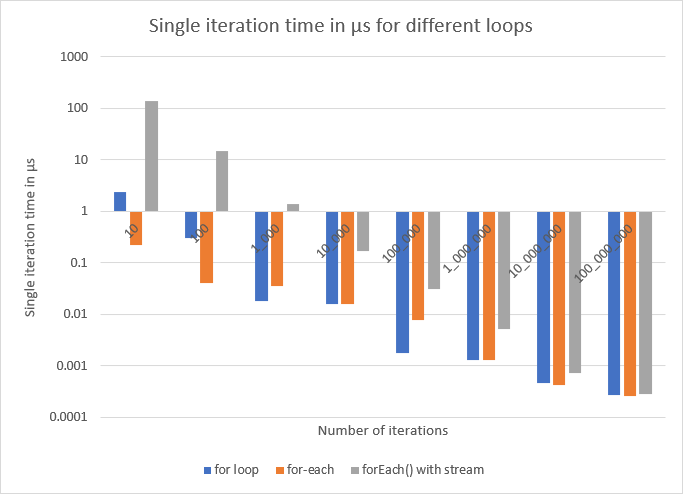EN
Java - for, for-each and forEach performance test
9
points
In this article, I would like to show results from simple performance tests for different types of for loop made on int array in Java.
Tests show what loop type is faster in different cases.

Below test conclusions:
forloop is fastest in many cases,- time necessary to iterate over array using different for-s going to be similar when array sizes are bigger,
- in some cases
for-eachcan be faster, what is visible when array sizes are bigger (for small arrays it is visible mostly).
Used Java: Amazon Corretto, x64, JDK 1.8.0_292
Used OS: Windows 10 x64
Used PC:
- Ryzen 9 5900x
- DRR 4 (2x 32GB)
- Samsung SSD M.2 970 EVO (1TB)
- GeForce GTX 970 (4GB RAM)
Total times needed to iterate over the array:
for type | for time | Array size |
for loop | 23.30 μs | 10 |
for-each | 2.200 μs |
10 |
forEach() with stream | 1.370 ms | 10 |
for loop | 29.90 μs | 100 |
for-each | 4.000 μs |
100 |
forEach() with stream | 1.457 ms | 100 |
for loop | 18.20 μs | 1_000 |
for-each | 36.40 μs |
1_000 |
forEach() with stream | 1.407 ms | 1_000 |
for loop | 157.8 μs | 10_000 |
for-each | 159.4 μs | 10_000 |
forEach() with stream | 1.667 ms | 10_000 |
for loop | 176.7 μs | 100_000 |
for-each | 790.2 μs | 100_000 |
forEach() with stream | 3.064 ms | 100_000 |
for loop | 1.282 ms | 1_000_000 |
for-each | 1.303 ms | 1_000_000 |
forEach() with stream | 5.150 ms | 1_000_000 |
for loop | 4.586 ms | 10_000_000 |
for-each | 4.272 ms | 10_000_000 |
forEach() with stream | 7.201 ms | 10_000_000 |
for loop | 27.58 ms | 100_000_000 |
for-each | 25.87 ms | 100_000_000 |
forEach() with stream | 28.65 ms | 100_000_000 |
Used source code:
import com.google.common.base.Stopwatch;
import java.util.Arrays;
import java.util.function.IntConsumer;
public class Example {
public static void main(String[] args) {
int size = 1_000_000; // change it to your size
int[] array = new int[size];
for (int i = 0; i < array.length; i++) {
array[i] = i;
}
// for loop
{
int sum = 0;
Stopwatch stopwatch = Stopwatch.createStarted();
for (int i = 0; i < array.length; i++) {
sum += array[i];
}
System.out.println(sum + " in " + stopwatch.stop());
}
// for-each loop
{
int sum = 0;
Stopwatch stopwatch = Stopwatch.createStarted();
for (int value : array) {
sum += value;
}
System.out.println(sum + " in " + stopwatch.stop());
}
// forEach method with stream
{
IntSumator sumator = new IntSumator();
Stopwatch stopwatch = Stopwatch.createStarted();
Arrays.stream(array).forEach(sumator); // or just Arrays.stream(array).forEach(value -> { ... });
System.out.println(sumator.getSum() + " in " + stopwatch.stop());
}
}
private static class IntSumator implements IntConsumer {
private int sum = 0;
public int getSum() {
return this.sum;
}
@Override
public void accept(int value) {
this.sum += value;
}
}
}
Stopwatch class from:
<!-- https://mvnrepository.com/artifact/com.google.guava/guava -->
<dependency>
<groupId>com.google.guava</groupId>
<artifactId>guava</artifactId>
<version>27.0.1-jre</version>
</dependency>
Alternative test source code
Alternatively, we can use the following test that repeats same tests few times dividing time by tests amount:
import com.google.common.base.Stopwatch;
import java.util.Arrays;
import java.util.concurrent.TimeUnit;
import java.util.function.IntConsumer;
public class Example {
public static void main(String[] args) throws InterruptedException {
int repeatsCount = 1000;
int arraySize = 1_000_000;
TimeUnit resultUnit = TimeUnit.MICROSECONDS;
int[] array = new int[arraySize];
for (int i = 0; i < array.length; i++) {
array[i] = i;
}
int sum1 = 0;
int sum2 = 0;
IntSumator sumator3 = new IntSumator();
Stopwatch stopwatch1 = Stopwatch.createUnstarted();
Stopwatch stopwatch2 = Stopwatch.createUnstarted();
Stopwatch stopwatch3 = Stopwatch.createUnstarted();
for (int j = 0; j < repeatsCount; ++j) {
// for loop
stopwatch1.start();
for (int i = 0; i < array.length; i++) {
sum1 += array[i];
}
stopwatch1.stop();
// for-each loop
stopwatch2.start();
for (int value : array) {
sum2 += value;
}
stopwatch2.stop();
// forEach method with stream
stopwatch3.start();
Arrays.stream(array).forEach(sumator3); // or just Arrays.stream(array).forEach(value -> { ... });
stopwatch3.stop();
}
int sum3 = sumator3.getSum();
double time1 = (double)stopwatch1.elapsed(resultUnit) / repeatsCount;
double time2 = (double)stopwatch2.elapsed(resultUnit) / repeatsCount;
double time3 = (double)stopwatch3.elapsed(resultUnit) / repeatsCount;
String unitAbbreviation = renderUnit(resultUnit);
System.out.println("time: " + time1 + " " + unitAbbreviation + ", sum: " + sum1 + " - for loop");
System.out.println("time: " + time2 + " " + unitAbbreviation + ", sum: " + sum2 + " - for-each loop");
System.out.println("time: " + time3 + " " + unitAbbreviation + ", sum: " + sum3 + " - forEach method with stream");
}
private static class IntSumatorimplements IntConsumer {
private int sum = 0;
public int getSum() {
return this.sum;
}
@Override
public void accept(int value) {
this.sum += value;
}
}
private static String renderUnit(TimeUnit unit) {
switch (unit) {
case NANOSECONDS: return "ns";
case MICROSECONDS: return "\u03bcs"; // μs
case MILLISECONDS: return "ms";
case SECONDS: return "s";
case MINUTES: return "min";
case HOURS: return "h";
case DAYS: return "d";
default:
throw new AssertionError();
}
}
}